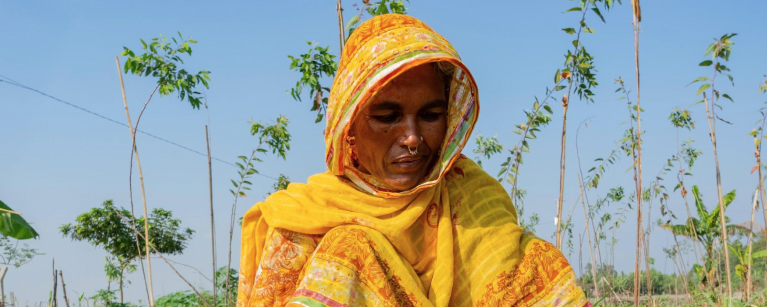Oxfam in its new briefing “Gendered Dimensions of Loss and Damage in Asia" released today, calls for the Loss and Damage Fund to prioritize women and marginalized communities who are at the frontline of the climate crisis.
The sum of about USD 400 million pledged to the newly setup Loss and Damage fund at the ongoing UN climate conference (COP28) is a positive step but just a drop in the ocean for communities, particularly in Asia, who are suffering climate extremes and the intangible loss of knowledge and heritage.
The briefing paper captures the nuanced gendered implications of both economic and non-economic losses in communities impacted by climate induced disasters in five countries of Asia – Bangladesh, Nepal, Pakistan, Philippines, and Timor Leste.
Women like Kulsum, from Bangladesh, have been displaced 20 times in 50-years of her life. She has had to re-build her life every 2.5 years. The only item she managed to save is a tin roof with holes. The increase in frequency of floods and heavy rains affected her ability to manage her menstrual flow: having no way to dry pads on rainy days and having to sometimes wade through deep water, she resorted to taking pills to stop menstruation.
“The loss and damage fund’s operationalization must be rooted in equality and justice. Neglecting to acknowledge the additional burdens of unpaid care work, such as women walking longer distances in search of water, is inherently unfair. Likewise, overlooking their right to secure spaces after displacement is a disservice to their well-being. The operational modality of the fund should be designed to actively include women in climate-related decision-making processes. Ensuring women's participation is not just essential for fairness but a critical step towards climate justice,” said John Samuel, Regional Director, Oxfam in Asia.
Loss and damage require multi-layered, holistic solutions through gender-transformative policy, programming, and financing. Both short- and long-term actions are crucial to address urgent needs and help communities rebuild sustainably.
The briefing paper makes actionable recommendations for governments across the global north and south, decision-makers at national level and civil society organizations.
Oxfam recommendations for policymakers and decision-makers at COP28:
- An important first step will be an Inclusive Governance of the Loss and Damage Fund. We particularly ask that the governing body should be gender-balanced and have designated seats for marginalized groups. Such inclusion will be a vital part of a broader participatory approach in decision-making across climate response.
- Women and non-binary communities should be actively consulted, involved, and meaningfully integrated into developing, assessing, formulating and implementing policies and funding programs.
- Recognition of unpaid care when addressing loss and damage: We advocate that classifications and definitions linked to loss and damage finance consider the critical role unpaid care plays in the paid economy and that the impacts on care work be included under economic loss and damage, despite care work itself often not being monetized.
- We are calling for comprehensive measurement and data collection for loss and damage: measurement of impacts by the fund and policy responses should include the social, emotional, and psychological impacts of loss and damage on communities.
- We propose a Gender-Intersectional Analysis of Loss and Damage Finance.
- Direct access to finance for local and marginalized groups.
- We push for the inclusion of feminist allies and Civil Society both in decision-making and access to funding. This means the fund must empower Women’s Rights Organizations (WROs) with flexible, multi-year funding that recognises and supports their vital work on the front lines of the climate crisis.
- We call for gender-transformative measures that support rights realization, including sexual and reproductive health rights. This includes strengthening welfare structures for women; supporting rural women’s food security; non-discriminatory access to resources; and equitable involvement in decision-making. Simultaneously, we call for gender-sensitive strengthening of WASH infrastructure, which has been shown to be particularly vital for women’s access to water and sanitation.
For media queries please contact:
Himanshi Matta | Asia Regional Media & Communications Lead | Himanshi.matta@oxfam.org
